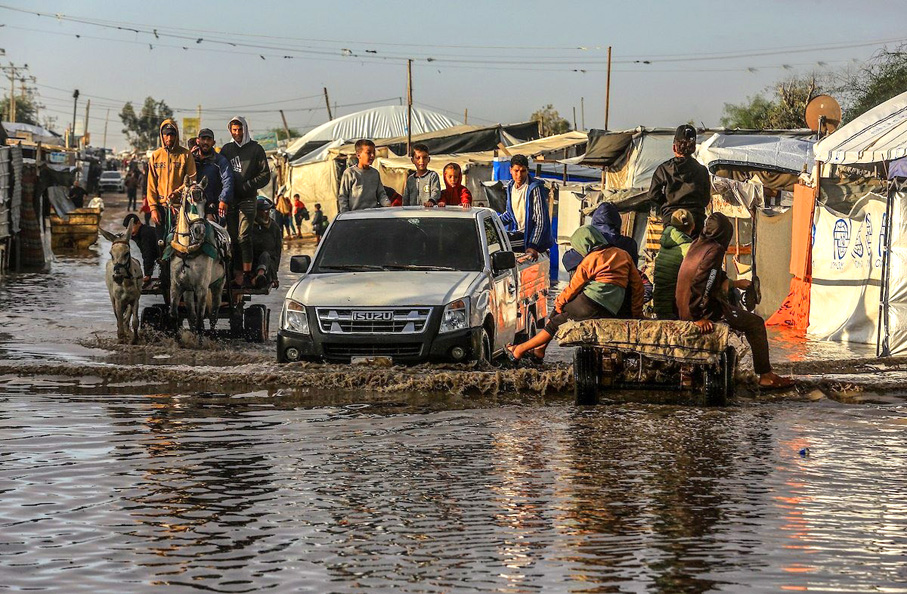TWO major humanitarian alerts issued on Tuesday and Wednesday underscored the accelerating collapse of living conditions in the Gaza Strip, where tens of thousands of displaced Palestinians are enduring freezing temperatures, flooding, and a rapidly deteriorating humanitarian situation.
The UN Relief and Works Agency for Palestine Refugees (UNRWA) warned that thousands of forcibly displaced families are struggling to find safe shelter as a new cold front approaches.
In a post on social media, the agency said tens of thousands of people have nothing more than improvised makeshift tents to protect them from the cold, stressing the urgent need for additional shelter materials and basic humanitarian supplies.
According to UNRWA, more than 79,000 displaced Palestinians are packed into 85 shelters across the territory, where humanitarian conditions continue to worsen as winter conditions intensify, posing heightened risks to children, women, and the elderly.
Stephane Dujarric, spokesperson for the UN secretary-general, cautioned that thousands of displaced families are at serious risk of flooding inside structurally weak shelters, noting that worsening weather conditions are putting residents ‘in great danger’.
He said Israeli restrictions continue to impede relief operations and block the entry of essential aid.
Heavy rainfall accompanying Tuesday’s weather system caused widespread flooding in southern Gaza, submerging dozens of tents in the al-Mawasi area of Khan Younis and further amplifying warnings of an imminent large-scale humanitarian disaster.
UN and humanitarian agencies estimate that Gaza faces an enormous shelter deficit, with nearly 300,000 tents and pre-fabricated units urgently needed after two years of widespread destruction of civilian homes, infrastructure, and public facilities.
In a separate appeal issued on Tuesday, the Palestinian NGO Network urged international human rights and humanitarian organisations, as well as governments worldwide, to formally designate Gaza a ‘humanitarian disaster zone’ and take immediate action to protect civilians and end the blockade.
The network called for the rapid delivery of tents and supplies to rehabilitate shelters, along with immediate food and relief assistance.
It emphasised the need to allow civil defence teams, medical personnel, and local and international humanitarian organisations to operate without obstruction and demanded an end to Israeli restrictions on the entry of essential goods.
The network cited recent international reports indicating that more than 90 per cent of Gaza’s population is suffering from malnutrition due to severe food shortages, unsafe water, and the collapse of basic services under continuous genocide-related attacks and daily military operations.
Meanwhile, the organisation ‘Jewish Voice’ reported on Tuesday that Israel violated the ceasefire agreement 500 times over a span of 44 days, asserting that ‘the genocide has not stopped’ despite the truce announced on 9th October.
Gaza’s Government Media Office documented 497 Israeli violations as of last Saturday and more having taken place this week.
The Israeli occupation forces are accused of repeated breaches that continued to endanger civilians.
Since 7th October, 2023, Gaza has faced a campaign widely described by Palestinian and international organisations as an Israeli genocide, encompassing mass killing, starvation, destruction, displacement, and arrests in defiance of international appeals and binding orders by the International Court of Justice to halt attacks.
Local data indicate that the war has resulted in more than 239,000 people martyred or injured, most of them women and children, in addition to over 11,000 missing and hundreds of thousands displaced and facing famine-like conditions.
Large portions of Gaza’s cities and infrastructure have been destroyed.
Meanwhile, in a separate report a new set of UN findings has revealed a catastrophic collapse in Gaza’s development and economy, warning that the Israeli genocide has wiped out nearly seven decades of progress and pushed the territory to the brink of non-existence.
Francesca Albanese, the UN special rapporteur on human rights in the occupied Palestinian territory, said a fresh UN report shows the scale of destruction unleashed since the Israeli genocide began in October 2023.
Albanese wrote on X that the devastation amounts to ‘the worst economic collapse ever recorded’, stressing: ‘This is not a war. It is genocide.’
The report, issued by the UN Conference on Trade and Development (UNCTAD), concludes that 69 years of human-development gains have been erased as health systems, schools, housing, infrastructure and even banking networks were destroyed.
According to the summary published by Albanese, the devastation ‘unleashed consecutive economic, humanitarian, environmental and social crises, pushing the occupied Palestinian territory from under-development into complete ruin’.
UNCTAD warns that rebuilding Gaza will require more than $70 billion (£53 billion) and may take decades, a process that will leave the Strip dependent on large-scale, sustained international support.
Even under optimistic projections of double-digit economic growth and substantial external aid, Gaza would still need many decades to regain the basic living standards it had before October 2023.
The report also finds that Gaza’s economy shrank by an unprecedented 87 per cent between 2023 and 2024, driving per-capita GDP down to just $161, one of the lowest figures ever recorded globally.
Every essential pillar of survival, food, shelter and healthcare, has collapsed, pushing Gaza to what the UN describes as ‘the edge of total breakdown’.
UNCTAD stresses that the destruction and blockade have generated ‘one of the ten worst economic crises in the world since 1960’.
The agency calls for an immediate, large-scale international intervention, including coordinated financial assistance, the easing of movement and trade restrictions, the resumption of financial transfers, and the introduction of an emergency basic-income programme providing unconditional monthly payments to every person in Gaza.
According to Gaza’s Ministry of Health, whose figures the UN considers reliable, at least 69,756 Palestinians, most of them women and children, have been killed by Israeli airstrikes and ground operations.
